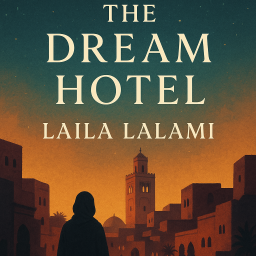The Dream Hotel by Laila Lalami
BOOKS REVIEW
Chaifry
7/20/20256 min read


Laila Lalami, a Moroccan-American author celebrated for her Pulitzer Prize-finalist novel The Moor’s Account and National Book Award-nominated The Other Americans, has long captivated readers with her incisive explorations of identity, migration, and societal inequities. Her fifth novel, The Dream Hotel, published in 2025 by Pantheon, marks her bold foray into speculative fiction, blending literary finesse with a chilling dystopian vision. Set in a near-future Los Angeles, the novel imagines a surveillance state where dreams are mined to predict crimes, ensnaring individuals in a Kafkaesque web of preemptive detention.
Lalami, whose work often draws from her immigrant experience and keen social critique, crafts a narrative that resonates with young readers navigating a world increasingly shaped by technology and eroded privacy.
This review argues that The Dream Hotel is a must-read for young readers due to its gripping narrative, thought-provoking themes, and relatable protagonist, offering a lens into the perils of unchecked technology and the resilience of the human spirit. Its exploration of surveillance, autonomy, and resistance speaks to the digital anxieties of Generation Z, while its accessible prose and emotional depth make it an ideal entry point into speculative fiction. For Indian young readers, the novel’s themes of systemic injustice and personal agency echo the works of authors like Bama, Vaikom Muhammad Basheer, Mulk Raj Anand, U.R. Ananthamurthy, and Kamala Markandaya, making it a vital read for those grappling with questions of freedom in a rapidly modernizing society.
The Dream Hotel opens with Sara Hussein, a Moroccan-American archivist and mother of toddler twins, detained at LAX after a conference in London: “She was eager to see her husband and children, but the agents’ faces were stone” (Lalami, 2025, p. 3). The Risk Assessment Administration (RAA), a federal agency, flags her for a high “risk score” based on data from her Dreamsaver implant, a neuroprosthetic device designed to aid sleep but secretly harvesting dream content. The algorithm predicts she will harm her husband, Elias, leading to her transfer to Madison, a retention center where “the air smelled of bleach and despair” (Lalami, 2025, p. 15). Promised a 21-day stay, Sara finds herself trapped in a profit-driven facility run by a private corporation, where “every rule was a test, every test a trap” (Lalami, 2025, p. 28).
The novel alternates between Sara’s present in the retention center and flashbacks to her life before detention, revealing her struggles with insomnia, motherhood, and a past trauma: “Her dreams were not her own anymore; they belonged to the machine” (Lalami, 2025, p. 45). At Madison, Sara joins other women—labeled “dreamers”—who face arbitrary rules and forced labor, such as laundering linens to lower their risk scores: “Work was salvation, they said, but it felt like punishment” (Lalami, 2025, p. 60). The facility’s bureaucracy, with its “forms that multiplied like roaches” (Lalami, 2025, p. 72), extends stays for minor infractions, trapping retainees in a cycle of compliance and despair. Sara’s interactions with fellow dreamers—Fatima, a defiant teenager; Mona, a resigned nurse; and Lila, a volatile newcomer—highlight their shared struggle: “We’re not criminals, we’re just women who dreamed too loudly” (Lalami, 2025, p. 90).
A pivotal moment occurs when Lila’s arrival disrupts the facility’s order, sparking Sara’s resistance: “She would not let them rewrite her story” (Lalami, 2025, p. 150). Flashbacks reveal Sara’s past, including a sexual assault at 19 that adds points to her risk score: “The past was a ghost that haunted her score, invisible but heavy” (Lalami, 2025, p. 110). Her memories of hiking with Elias at Yosemite’s Mirror Lake contrast sharply with her confinement: “The lake had been a mirror, but now she saw only walls” (Lalami, 2025, p. 130). The novel’s climax, set against a wildfire threatening Madison, forces Sara to confront the corporations profiting from her detention: “The algorithm made up stories, plausible enough to cage her” (Lalami, 2025, p. 200). Her small-scale rebellion, inspired by Kafka and Atwood, culminates in a defiant act of agency, affirming “freedom was not given; it was taken” (Lalami, 2025, p. 250).
The Dream Hotel is a masterful blend of speculative fiction, thriller, and literary drama, crafted with Lalami’s signature “silky and celebrated prose” (Lalami, 2025, p. 7). Its premise, reminiscent of Philip K. Dick’s The Minority Report and Margaret Atwood’s The Handmaid’s Tale, is chillingly plausible, as Lalami grounds futuristic technology in present-day concerns about surveillance capitalism. The novel’s setting, a near-future Los Angeles where “chips in brains were as common as smartphones” (Lalami, 2025, p. 10), resonates with young readers immersed in a digital world, making the RAA’s intrusion into dreams a stark warning. Sara’s character is a triumph—her role as a mother and archivist makes her relatable, while her rage and resilience, as in “beneath her calm, a fire burned” (Lalami, 2025, p. 100), inspire empathy and admiration.
Lalami’s prose is both accessible and lyrical, ideal for young readers new to speculative fiction. The interspersed RAA reports and terms-of-service agreements add a realistic, chilling texture, exposing the “cruel bureaucracy that fed on compliance” (Lalami, 2025, p. 80). The novel’s pacing, described as “gripping” by reviewers, keeps readers engaged, with vivid scenes like Sara’s interrogation at LAX evoking “sweaty palms and a racing heart” for anyone familiar with airport security. The ensemble cast—Fatima’s defiance, Mona’s quiet strength, Lila’s volatility—creates a dynamic community, reflecting the diverse struggles of women under surveillance, a theme young readers can connect to through social media’s omnipresence.
For Indian young readers, the novel’s themes of systemic injustice mirror Bama’s Karukku, where Dalit women face societal oppression, and Mulk Raj Anand’s Untouchable, which critiques caste-based indignities. Sara’s detention for her dreams parallels the arbitrary profiling faced by marginalized groups in India, as seen in Basheer’s Balyakalasakhi. Lalami’s exploration of resistance, akin to Ananthamurthy’s Samskara, empowers young readers to question authority, while the environmental backdrop of wildfires echoes Markandaya’s Nectar in a Sieve, where nature underscores human vulnerability.
Despite its strengths, The Dream Hotel has minor flaws. The third-person present-tense narration, while immersive, occasionally feels claustrophobic, limiting the depth of secondary characters like Fatima and Mona, who remain “flat and uninteresting” compared to Sara. A first-person perspective might have heightened Sara’s interiority, making her struggle more immediate for young readers. The novel’s focus on Sara’s perspective, with only one chapter from a DreamSaver employee, misses opportunities to humanize other characters, as noted by some critics. The ending, while poignant, feels abrupt, with Sara’s rebellion resolving too quickly, potentially leaving young readers wanting a more climactic resolution.
The novel’s American setting may slightly distance Indian young readers accustomed to the vivid cultural specificity of Basheer or Markandaya. While the themes are universal, the lack of explicit cultural ties to South Asian experiences could make it less immediately relatable than, say, Anand’s Coolie. Additionally, the heavy reliance on dream surveillance as a plot device risks feeling gimmicky, as some reviewers note a tendency to “skim” dream-heavy passages due to their symbolic weight. The audiobook, narrated by Frankie Corzo, while effective, occasionally struggles with pacing during dense expository sections, which may challenge younger listeners.
Why Indian Readers Must Read This Book
The Dream Hotel is a vital read for Indian young readers, resonating with the subcontinent’s struggles against systemic injustice and loss of agency. Sara’s detention for her dreams mirrors the profiling of marginalized communities in India, as depicted in Bama’s Karukku, where Dalit women navigate oppressive structures. Her reflection, “The past was a ghost that haunted her score” (Lalami, 2025, p. 110), echoes the weight of historical inequities in Mulk Raj Anand’s Untouchable, where caste shapes destiny. The novel’s surveillance state parallels India’s growing digital infrastructure, where Aadhaar and data privacy debates raise similar concerns, making it a timely cautionary tale for tech-savvy youth. The theme of resistance, as in “freedom was not given; it was taken” (Lalami, 2025, p. 250), aligns with U.R. Ananthamurthy’s Samskara, where characters challenge societal norms.


Sara’s found family among the dreamers reflects the makeshift communities in India’s urban slums, akin to Basheer’s Balyakalasakhi, offering hope to young readers facing social pressures. The environmental motif of wildfires, threatening Madison, resonates with Markandaya’s Nectar in a Sieve, where nature amplifies human struggle, connecting to India’s climate challenges. For young readers inspired by Arundhati Roy’s The God of Small Things, Lalami’s lyrical prose and social critique provide a global perspective, encouraging reflection on privacy, identity, and resistance in a digital age.
The Dream Hotel is a haunting, urgent novel that cements Laila Lalami’s status as a literary luminary. Its blend of speculative fiction and emotional depth, with prose that is “ceaselessly clear-eyed” (Lalami, 2025, p. 5), captivates young readers while challenging them to confront technology’s seductive dangers. Despite minor flaws—an abrupt ending and underdeveloped secondary characters—its compelling protagonist, vivid setting, and resonant themes make it a standout. For Indian young readers, its parallels with Bama, Basheer, Anand, Ananthamurthy, and Markandaya offer a powerful lens into shared struggles, urging them to question surveillance and embrace resilience. I wholeheartedly recommend The Dream Hotel to young readers seeking a thrilling, thought-provoking journey, one that reminds us that “we’re not criminals, we’re just women who dreamed too loudly” (Lalami, 2025, p. 90) and that freedom is worth fighting for.
